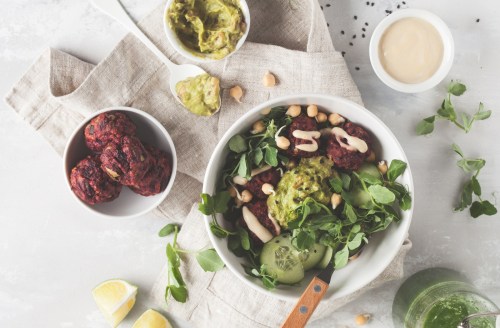Our editors independently select these products. Making a purchase through our links may earn Well+Good a commission
Ancient super-ingredient tahini is now popping up in *all* the foods—but is it healthy?
Thanks to its versatile flavor, you can now find tahini—a paste made from sesame—in everything from salad dressings to brownies. Here are a few of its nutritional benefits.

When the internet deems a certain superfood “cool,” it follows that foodies everywhere will start dreaming up ways to pack the newest darling into meals both sweet and savory. (Case in point: The avocado craze has officially breached even baked goods.) So when I noticed sesame-seed-derived tahini—a tan condiment that’s a mainstay in Mediterranean and Middle Eastern cuisine—starting to play the food-course field (sorry, hummus), I found myself experiencing Jonathan Van Ness–levels of curiosity. Why is this seed butter worthy of oatmeals, quinoa bowls, and desserts alike? Its benefits must be pretty great.
The first reason is the flavor. The sesame derivative has a robust, slightly bitter taste that’s just as rich as your standard almond or peanut butter. This trait allows the ingredient to stealthily disguise itself in, well, just about anything. And second, tahini is dairy-free, keto-compliant, and packed with nutrients. (More on that below.) Basically, it’s a versatile yet nutritious powerhouse.
Check out 3 reasons a tablespoon of tahini can boost vegan mac and cheese and ice cream alike.
1. Healthy fats galore
Of every nut and seed out there, sesame seeds contain the highest oil content by weight, Dr. Axe reports. Since these mighty seeds are composed of 55 percent oil and 20 percent protein, they provide your bod with healthy fats (which are key to cognitive health) and essential amino acids (which help build healthy skin, strong bones, and muscle mass).
2. Get ready to glow
When you combine the amino acids, vitamin E, B vitamins, trace minerals, zinc, and fatty acids all found in tahini, you’re left with a glow-inducing cocktail fit to soothe many a skin woe.
3. Hello, anti-inflammatory properties
One study notes that sesame has a high absorption rate for compounds like tocopherol, which is found in inflammation-fighting vitamin E. Subjects in the study who ingested sesame oil instead of walnut or soy oil had 19.1 percent higher levels of tocopherol on average than their counterparts.
Now that you’re in the know about tahini, meet two other of-the-moment powerhouse foods: lucuma fruit and algae.
Sign Up for Our Daily Newsletter
Get all the latest in wellness, trends, food, fitness, beauty, and more delivered right to your inbox.
Got it, you've been added to our email list.










